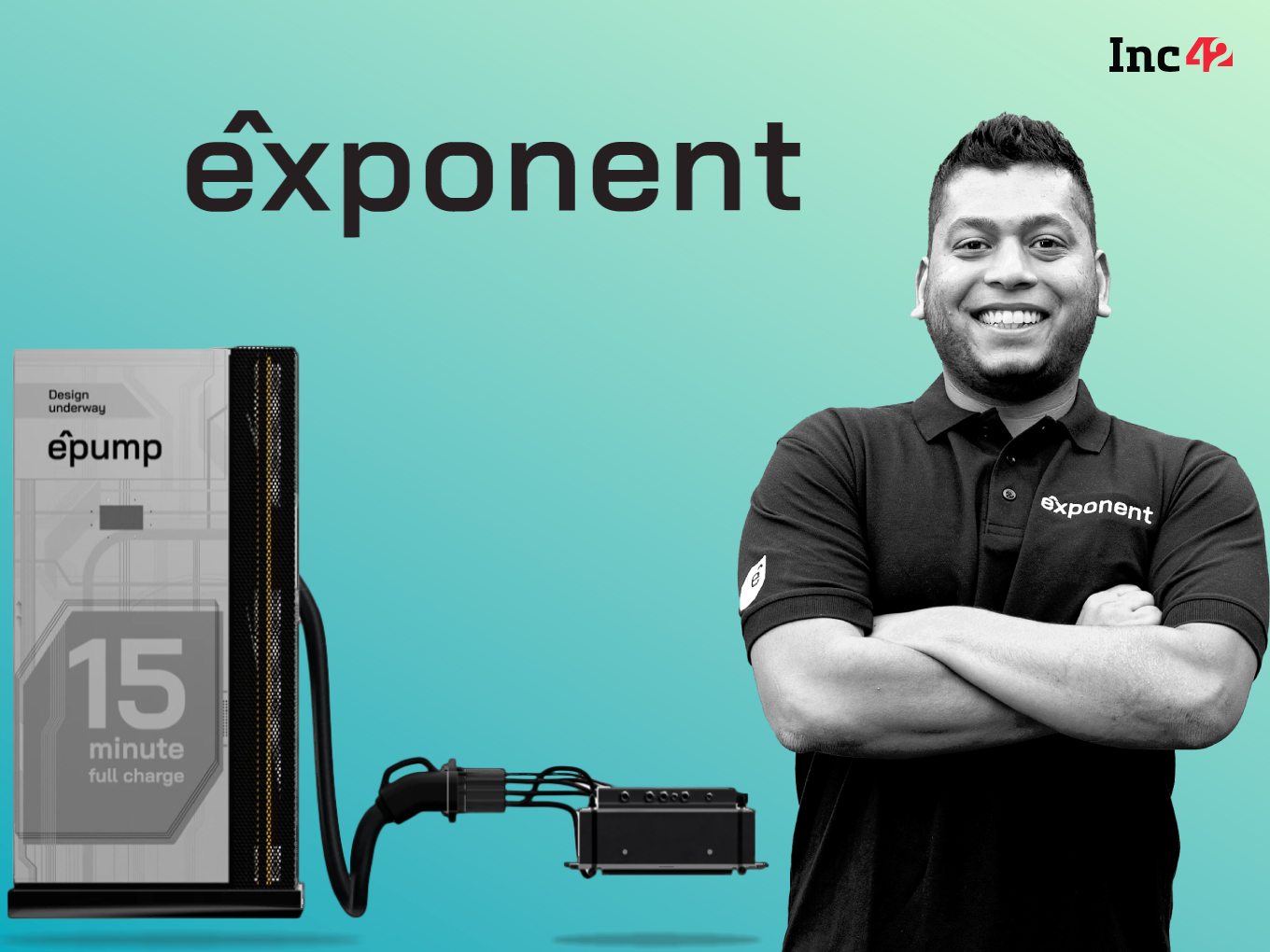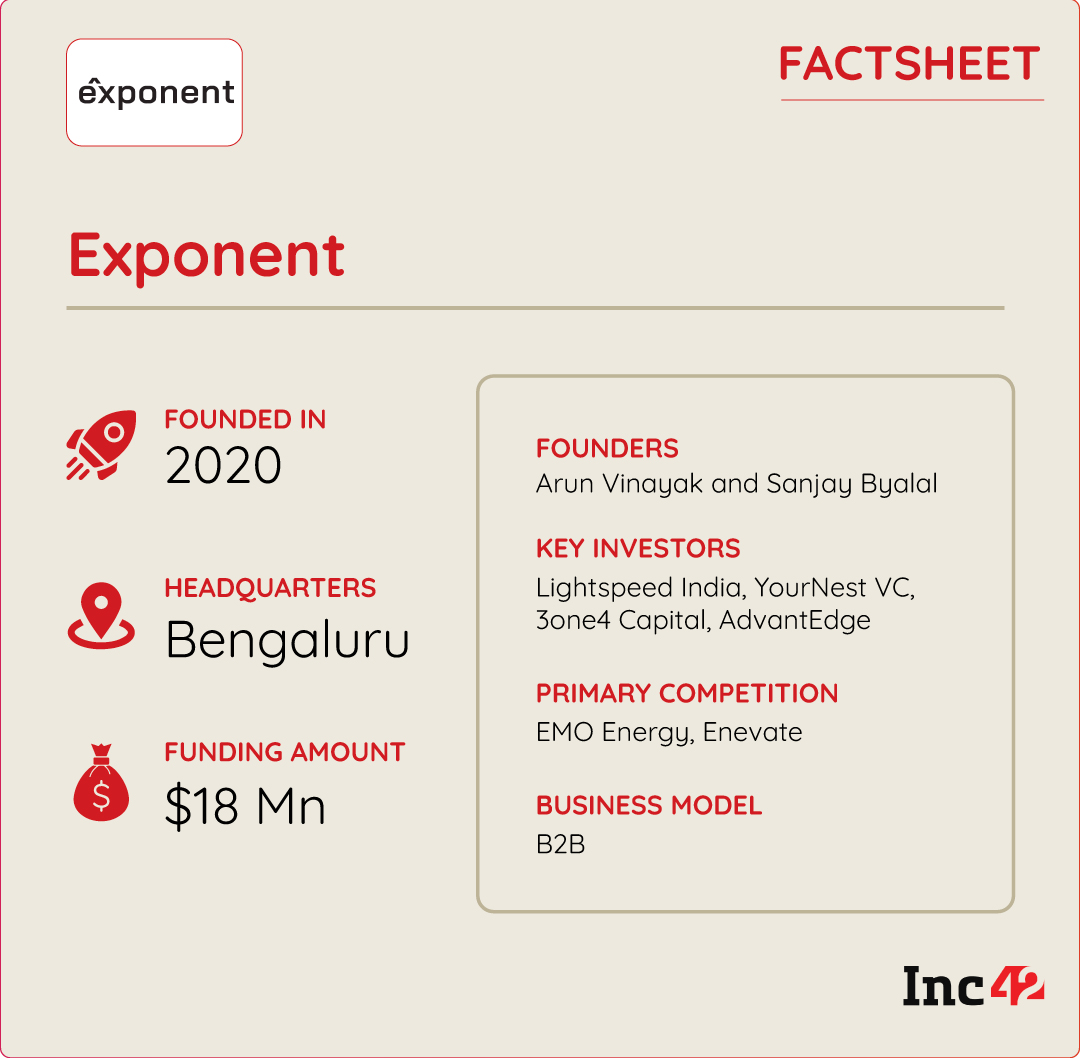Clik here to view.

At a time when commercially viable battery charging technologies worldwide take a minimum of 30 minutes to a maximum of 10 hours to fully charge electric vehicles (EVs), depending on battery capacity and vehicle types, Bengaluru-based Exponent Energy claims to have broken all records with its 15-minute EV charging tech, with the vehicle category no bar.
The startup has made 15-minute rapid charging an on-road reality with its patented ‘water-based’ off-board thermal management system.
But before we delve deeper into the technology and Exponent Energy’s journey in building its tech stack, it is pertinent to understand why such a technology is groundbreaking.
In an attempt to make the usage of EVs more seamless, various players across the globe are working on curbing the EV charging time down to as low as 10 minutes.
However, so far, only a handful of players, including Tesla, California-based Enevate, and European tech giant ABB, have been successful in achieving this and that too for certain use cases, while many such technologies are still being championed in ultra hi-tech labs.
Amid this, India’s Exponent Energy’s tech innovation is applicable across use cases. The tech not only reduces charging time but also enhances the life of EV batteries, thereby making them cost-effective in the long run.
Spilling The 15-Minute Rapid Charging Beans
Former Ather Energy executives Arun Vinayak and Sanjay Byalal founded Exponent Energy in 2020, with the sole motive of building a tech enablement platform that can help original equipment manufacturers (OEMs) across segments to go electric with unmatched agility.
According to CEO and cofounder Vinayak, the only hurdle in the path of EV adoption in India is the efficiency of these vehicles, which can be improved multifold.
“Our problem statement in focus was battery life, battery charging times, the charging network… this is where the energy stack was really broken, and we needed to make energy much faster, simpler, accessible, and affordable,” Vinayak said.
When it comes to rapid charging, the biggest hurdle is overheating of batteries and battery life degradation. A 15-minute rapid charging generates almost 256X more heat than a 4-hour charging, which is the industry average.
Notably, lithium-ion (Li-ion) batteries are highly sensitive to extreme temperature conditions. Hence, battery thermal management systems are crucial for these battery packs as they help them function seamlessly even in extreme temperatures.
In most cases, various cooling systems such as air cooling, liquid cooling, and phase change material cooling are used worldwide to keep these batteries at their optimal temperature.
However, according to Vinayak, liquid cooling systems, which are the most common solution for thermal management in EVs today, hardly solve this problem, particularly in countries like India where the ambient temperature is normally 40 degrees Celsius or higher.
To resolve this, Exponent has built an advanced heating, ventilation, and air conditioning (HVAC) system, which is ‘off-boarded’ from the vehicle and is deployed at its charging stations, ‘e^pump’.
EV players like Tesla, Lucid, and Hyundai also have advanced HVAC systems, but the only issue is that these systems are an integral part of their vehicles and make them heavier and more expensive.
To resolve this pain point, the startup has built chargers and charging stations that come with this technology, reducing the burden on OEMs to incorporate such technology in EVs.
Its charging station, ‘e^pump’, transfers refrigerated water through its charging connector, ‘e^plug’, preventing Li-ion cells in its batteries from getting overheated while charging. The technology ensures that the temperature of its battery packs, ‘e^packs’, doesn’t exceed 35°C in any climatic condition.
Overall, Exponent Energy’s secret sauce of efficient 15-minute rapid charging is engrained in its tech stack that comprises ‘e^packs’, ‘e^pumps’, and ‘e^plugs’.
Making Batteries Last Longer
Besides reducing the charging time by controlling overheating, Exponent Energy has also been able to increase battery life by controlling lithium plating – the formation of metallic lithium around the anode of Li-ion batteries during charging.
Lithium plating is a phenomenon that degrades battery life and leads to battery malfunction.
While newer and more advanced cell chemistries are being developed to change the anode itself at a fundamental level, they are not mainstream yet.
“We are using the same material science and same anode but using a more software and electronics-based approach to smartly push the same anode to do more without actually damaging it,” Vinayak said. He added that the startup’s BMS and charging algorithms have been able to address the problem of lithium plating at the grassroots level, increasing the battery life.
Building The Business
Since its inception, Exponent Energy has raised $18 Mn in total funding from the likes of Lightspeed India, YourNest VC, 3one4 Capital, AdvantEdge VC, Hero MotoCorp’s chairman and CEO Dr Pawan Munjal’s family office, and Motherson Group.
Enabling efficient last-mile deliveries being the startup’s major focus area, it partnered with one of the leading OEMs in the three-wheeler commercial vehicle segment, Altigreen Propulsion Labs, in 2022. It claims that EVs powered by its tech stack have already covered over 10 Lakh kms with more than 25,000 rapid charging sessions.
However, the only catch here is that the startup sells its entire tech stack as a solution, and its ‘e^pumps’ can only charge ‘e^packs’. It has its ‘e^pumps’ at 30 locations in Bengaluru, which generate revenues on a subscription basis, based on the energy consumed per vehicle.
Image may be NSFW.
Clik here to view.
The startup’s ‘e^packs’ can be charged anywhere but they take at least an hour to fully charge. For maximum 15-minute efficiency, the battery packs need the company’s proprietary ‘e^plugs’ and ‘e^pumps’.
All of Exponent’s battery packs, which are also cell agnostic, come with a warranty of 3,000 cycle life, 3X the industry standard. They cost almost 30% less than other EV batteries in the market, as per the company.
Charging Ahead
After establishing its first set of charging networks in Bengaluru, Exponent Energy is planning to expand its operations to five more cities – Delhi NCR, Mumbai, Hyderabad, Chennai and Ahmedabad – by the end of the financial year 2023-24.
The startup has also set an ambitious target of deploying 1,000 ‘e^pumps’ and 25,000 Exponent-powered EVs by 2025 in the aforementioned cities, eyeing a revenue of around INR 600 Cr during the year.
Currently, more than 200 EVs powered by the startup are running on Bengaluru roads.
Vinayak says that as an energy company, Exponent is more focussed on high-energy value products, hence the startup is not looking to enable two-wheelers right now. After three-wheeler commercial vehicles, it would target the three-wheeler passenger vehicle market.
Besides, Exponent is all set to soon launch 15-minute rapid charging capabilities for intercity ebuses as well as etrucks by next year.
It must be noted that the ebuses market is slowly getting more mature in the country, with existing and new players launching intercity bus services with well-established charging networks. Currently, FreshBus and NueGo are the two main players in this market, with the likes of ZingBus expected to enter the market soon.
While Exponent currently faces minimal competition in India, more players could emerge with advanced cell chemistries and battery tech as the EV industry keeps growing. To substantiate this fact, Bengaluru-based EMO Energy has also launched 30-minute chargeable portable battery packs for various vehicle categories.
Meanwhile, big players like Ola Electric are working on building their own cell and battery technology, though it remains to be seen if, and to what degree, the upcoming technologies would prove to be pathbreaking in the near future.
The post Locking Horns With Tesla? Here’s How Exponent Energy Has Made 15-Minute EV Charging A Reality appeared first on Inc42 Media.